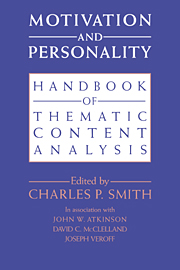Book contents
- Frontmatter
- Contents
- List of contributors
- Preface
- Acknowledgments
- 1 Introduction: inferences from verbal material
- PART I GENERAL ISSUES
- PART II CONTENT ANALYSIS SYSTEMS
- 9 The achievement motive
- 10 A scoring manual for the achievement motive
- 11 The motive to avoid success
- 12 A revised scoring manual for the motive to avoid success
- 13 The affiliation motive
- 14 A scoring manual for the affiliation motive
- 15 The intimacy motive
- 16 The intimacy motivation scoring system
- 17 Affiliative trust–mistrust
- 18 A scoring system for affiliative trust–mistrust
- 19 Power motivation
- 20 A scoring manual for the power motive
- 21 Power motivation revisited
- 22 A revised scoring system for the power motive
- 23 Personal causation and the origin concept
- 24 The origin scoring system
- 25 Explanatory style
- 26 The explanatory style scoring manual
- 27 Conceptual/integrative complexity
- 28 The conceptual/integrative complexity scoring manual
- 29 Uncertainty orientation
- 30 A manual for scoring need for uncertainty
- 31 Assessing adaptation to life changes in terms of psychological stances toward the environment
- 32 Scoring manual for psychological stances toward the environment
- 33 Self-definition and social definition: personal styles reflected in narrative style
- 34 Revised scoring manual for self-definition and social definition
- 35 Responsibility
- 36 Scoring system for responsibility
- PART III METHODOLOGY, SCORER TRAINING, DATA COLLECTION
- Appendix I Practice materials for learning the scoring systems
- Appendix II Pictures used to elicit thematic apperceptive stories
- Appendix III How to order additional practice materials
- References
- Name Index
- Subject Index
34 - Revised scoring manual for self-definition and social definition
Published online by Cambridge University Press: 16 October 2009
- Frontmatter
- Contents
- List of contributors
- Preface
- Acknowledgments
- 1 Introduction: inferences from verbal material
- PART I GENERAL ISSUES
- PART II CONTENT ANALYSIS SYSTEMS
- 9 The achievement motive
- 10 A scoring manual for the achievement motive
- 11 The motive to avoid success
- 12 A revised scoring manual for the motive to avoid success
- 13 The affiliation motive
- 14 A scoring manual for the affiliation motive
- 15 The intimacy motive
- 16 The intimacy motivation scoring system
- 17 Affiliative trust–mistrust
- 18 A scoring system for affiliative trust–mistrust
- 19 Power motivation
- 20 A scoring manual for the power motive
- 21 Power motivation revisited
- 22 A revised scoring system for the power motive
- 23 Personal causation and the origin concept
- 24 The origin scoring system
- 25 Explanatory style
- 26 The explanatory style scoring manual
- 27 Conceptual/integrative complexity
- 28 The conceptual/integrative complexity scoring manual
- 29 Uncertainty orientation
- 30 A manual for scoring need for uncertainty
- 31 Assessing adaptation to life changes in terms of psychological stances toward the environment
- 32 Scoring manual for psychological stances toward the environment
- 33 Self-definition and social definition: personal styles reflected in narrative style
- 34 Revised scoring manual for self-definition and social definition
- 35 Responsibility
- 36 Scoring system for responsibility
- PART III METHODOLOGY, SCORER TRAINING, DATA COLLECTION
- Appendix I Practice materials for learning the scoring systems
- Appendix II Pictures used to elicit thematic apperceptive stories
- Appendix III How to order additional practice materials
- References
- Name Index
- Subject Index
Summary
GENERAL INSTRUCTIONS
This scoring manual is designed to be used to score thematic apperception stories. It involves evaluating the presence or absence of five stylistic characteristics of stories. Two of these characteristics (Causality and Reason-Action Sequence) are scored +1; the other three (Uncaused Action, Mental State Ending, and Ineffective Actor) are scored −1 (“negative” and “positive” scores simply indicate positions along a bipolar continuum rather than evaluations). Each scoring category should be evaluated independently of each other category. Each category may be scored only once per story. Therefore, each story will receive a score ranging from −3 to +2.
In preparation for scoring a story, a scorer must make a number of judgments. These judgments involve two general issues: First, what are the essential components of the narrative? That is, the scorer must identify the story plot and separate that plot from any editorial commentary by the author that is irrelevant to the story. Typically “editorial comments” include comments on the picture used to elicit the story (“that's very dated,” “that's too dark,” etc.), political statements (“this is elitist”), and evaluations or judgments (“I don't like her,” etc.). However, if a story is nothing but such editorial comment, and involves no narrative at all, then Uncaused Action (UA) is scored.
- Type
- Chapter
- Information
- Motivation and PersonalityHandbook of Thematic Content Analysis, pp. 489 - 499Publisher: Cambridge University PressPrint publication year: 1992
- 1
- Cited by



